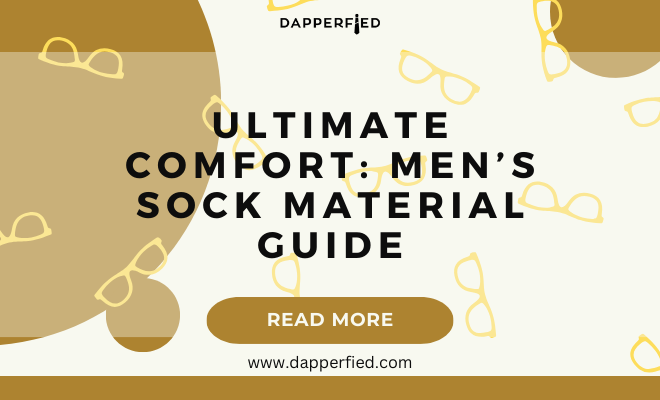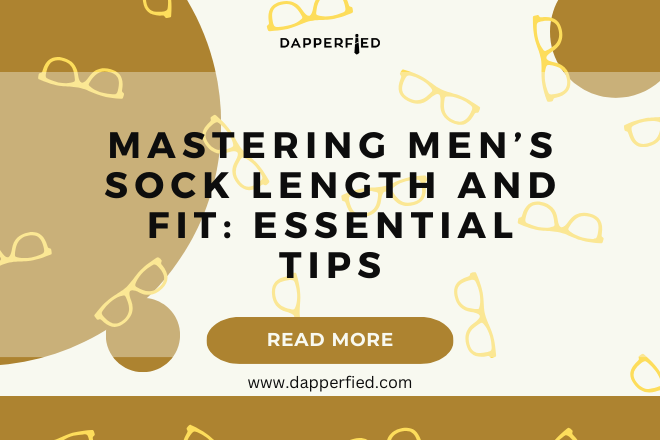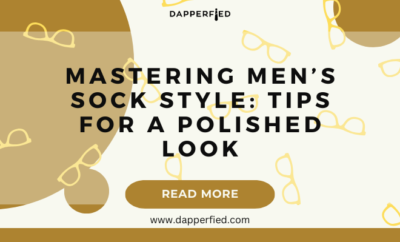
Men's Style
Ultimate Comfort: Men’s Sock Material Guide
When selecting socks, the material composition is a critical factor to consider. Various sock materials provide distinct advantages, including breathability, insulation, moisture management, environmental sustainability, longevity, elasticity, and comfort. Familiarizing oneself with the properties of different materials enables informed decision-making based on individual needs and preferences.
The range of available sock materials is extensive, spanning from traditional cotton to premium silk, with each option offering unique characteristics and benefits. Understanding these differences allows consumers to choose socks that best suit their specific requirements, whether for daily wear, athletic activities, or special occasions.
Key Takeaways
- Cotton is a classic choice for breathability in socks
- Merino wool offers ultimate warmth and moisture-wicking properties
- Bamboo is an eco-friendly and soft option for socks
- Nylon and polyester blends provide durability and stretchiness
- Silk is a luxurious and lightweight choice for socks
- Consider your lifestyle to find the perfect sock material for your needs
Cotton: The Classic Choice for Breathability
Benefits of Cotton Socks
Cotton is a natural fiber that allows air to circulate around the feet, keeping them cool and dry. Cotton socks are soft and gentle on the skin, making them an excellent option for daily wear. Additionally, cotton is a durable material that can withstand regular washing and wear.
Limitations of Cotton Socks
However, it is important to note that cotton does not have the best moisture-wicking properties, so it may not be the ideal choice for intense physical activities or for individuals with sweaty feet. On the other hand, cotton socks are not the best choice for moisture-wicking, as they tend to retain moisture and take longer to dry compared to other materials. This can lead to discomfort and potential foot odor.
Considerations for Choosing Cotton Socks
Additionally, cotton socks may not provide enough insulation in cold weather, as they do not retain heat as effectively as other materials. It is important to consider these factors when choosing cotton socks for specific activities or weather conditions. Overall, while cotton socks are a classic choice for breathability and comfort, they may not be the most suitable option for all situations.
Merino Wool: The Ultimate in Warmth and Moisture Wicking
Merino wool is a high-quality natural fiber that is renowned for its exceptional warmth and moisture-wicking properties. Unlike traditional wool, merino wool is incredibly soft and fine, making it comfortable to wear against the skin. Merino wool socks are excellent for cold weather, as they provide superior insulation and regulate temperature to keep feet warm and dry.
Additionally, merino wool has natural moisture-wicking abilities, drawing sweat away from the skin and preventing the buildup of moisture and odor. This makes merino wool socks an ideal choice for outdoor activities, sports, and hiking, as they keep feet dry and comfortable even during intense physical exertion. Furthermore, merino wool is naturally antibacterial, which helps prevent the growth of odor-causing bacteria and keeps socks fresh for longer periods between washes.
This makes merino wool socks a practical and low-maintenance option for individuals with active lifestyles. However, it is important to note that merino wool socks may require special care when washing to maintain their softness and shape. Overall, merino wool socks are the ultimate choice for warmth, moisture-wicking, and odor control, making them an excellent option for outdoor activities and cold weather.
Bamboo: The Eco-Friendly and Soft Option
| Metrics | Data |
|---|---|
| Renewability | Fast-growing and renewable resource |
| Softness | Softer than cotton |
| Eco-friendly | Low environmental impact |
| Antibacterial properties | Naturally antibacterial |
Bamboo is a sustainable and eco-friendly material that has gained popularity in the textile industry due to its softness and environmental benefits. Bamboo socks are incredibly soft and gentle on the skin, making them a comfortable choice for everyday wear. Additionally, bamboo fibers have natural antibacterial properties, which help prevent the growth of odor-causing bacteria and keep feet fresh throughout the day.
Bamboo is also highly absorbent and wicks moisture away from the skin, making it an excellent choice for individuals with sweaty feet or those who engage in physical activities. Furthermore, bamboo is a renewable resource that grows quickly and requires minimal water and pesticides to thrive. This makes bamboo socks an environmentally friendly option for eco-conscious consumers.
However, it is important to note that bamboo socks may not be as durable as other materials and may require special care when washing to maintain their softness and shape. Overall, bamboo socks are a soft, comfortable, and eco-friendly option that provides natural antibacterial properties and moisture-wicking abilities.
Nylon and Polyester: The Durable and Stretchy Blend
Nylon and polyester are synthetic materials commonly used in sock blends to enhance durability and stretchiness. These materials are known for their strength and resilience, making them ideal for athletic and performance socks that require extra support and longevity. Nylon and polyester fibers are highly resistant to abrasion and tearing, ensuring that socks maintain their shape and integrity even after repeated wear and washing.
Additionally, these materials provide excellent stretch and elasticity, allowing socks to conform to the shape of the foot without becoming loose or sagging. Moreover, nylon and polyester socks are quick-drying and moisture-wicking, making them suitable for intense physical activities that generate sweat. These materials help keep feet dry and comfortable during workouts or sports activities.

However, it is important to note that nylon and polyester may not provide the same level of breathability as natural fibers such as cotton or merino wool. This can lead to potential heat retention and discomfort in hot weather or prolonged wear. Overall, nylon and polyester blends are durable, stretchy, and moisture-wicking options that are well-suited for athletic performance and high-impact activities.
Silk: The Luxurious and Lightweight Choice
Finding the Perfect Sock Material for Your Lifestyle
When choosing the perfect sock material for your lifestyle, it is essential to consider your specific needs and preferences. Whether you prioritize breathability, warmth, moisture-wicking, eco-friendliness, durability, stretchiness, or luxury, there is a wide range of materials to choose from that cater to different requirements. For everyday wear or casual activities, breathable and comfortable materials such as cotton or bamboo may be suitable options.
For outdoor adventures or cold weather conditions, merino wool offers superior warmth and moisture-wicking abilities. For athletic performance or high-impact activities, nylon and polyester blends provide durability, stretchiness, and moisture-wicking properties. For formal occasions or luxurious comfort, silk socks offer a stylish and lightweight choice.
It is important to consider the specific characteristics of each material and how they align with your lifestyle and activities. Additionally, factors such as environmental impact, maintenance requirements, and skin sensitivities should also be taken into account when selecting the perfect sock material. In conclusion, understanding the different sock materials available allows you to make an informed decision based on your individual needs and preferences.
Whether you prioritize breathability, warmth, moisture-wicking, eco-friendliness, durability, stretchiness, or luxury, there is a wide range of materials to choose from that cater to different requirements. By considering the unique properties of each material, you can find the perfect sock material that enhances comfort, performance, and style in your daily life.
If you’re interested in learning more about men’s fashion and building a versatile wardrobe, check out this article on building a men’s capsule wardrobe. It’s important to consider not only the style of your clothing, but also the comfort and quality of the materials, including socks. This article provides valuable insights into creating a wardrobe that is both stylish and functional.
FAQs
What are the most common materials used for men’s socks?
The most common materials used for men’s socks are cotton, wool, bamboo, and synthetic fibers such as polyester and nylon.

Which sock material is the most comfortable for men?
The most comfortable sock material for men varies depending on personal preference and the intended use of the socks. However, many men find that socks made from merino wool or bamboo are particularly comfortable due to their softness, breathability, and moisture-wicking properties.
What are the benefits of cotton socks for men?
Cotton socks are popular for their softness, breathability, and ability to absorb moisture, making them a comfortable choice for everyday wear. However, they may not be the best option for athletic activities or for keeping feet warm in cold weather.
Are wool socks a good choice for men’s comfort?
Wool socks are a popular choice for men’s comfort due to their natural insulation, moisture-wicking properties, and ability to regulate temperature. They are often recommended for outdoor activities and cold weather, as they can keep feet warm and dry.
What are the advantages of bamboo socks for men?
Bamboo socks are known for their softness, breathability, and moisture-wicking properties, making them a comfortable choice for men. They are also hypoallergenic and eco-friendly, as bamboo is a sustainable and renewable resource.
Are synthetic fiber socks comfortable for men?
Synthetic fiber socks, such as those made from polyester or nylon, are often designed to be lightweight, durable, and moisture-wicking, making them a comfortable choice for men, especially for athletic activities. However, some men may find that natural fibers like cotton, wool, or bamboo are more comfortable for everyday wear.
















